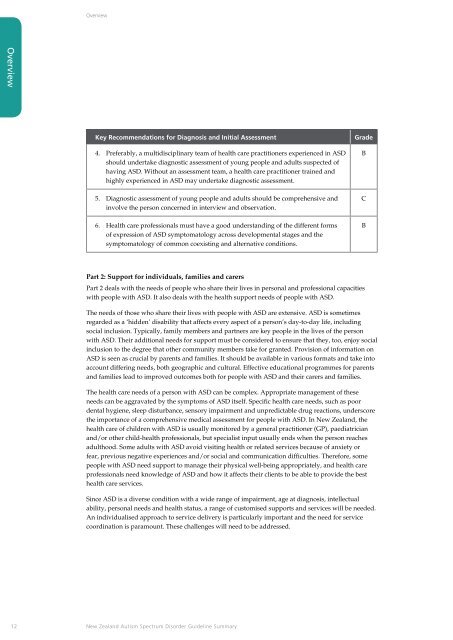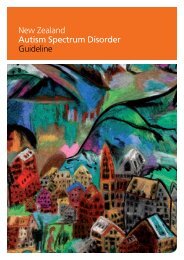New Zealand Autism Spectrum Disorder ... - Ministry of Health
New Zealand Autism Spectrum Disorder ... - Ministry of Health
New Zealand Autism Spectrum Disorder ... - Ministry of Health
You also want an ePaper? Increase the reach of your titles
YUMPU automatically turns print PDFs into web optimized ePapers that Google loves.
Overview<br />
Overview<br />
Key Recommendations for Diagnosis and Initial Assessment<br />
4. Preferably, a multidisciplinary team <strong>of</strong> health care practitioners experienced in ASD<br />
should undertake diagnostic assessment <strong>of</strong> young people and adults suspected <strong>of</strong><br />
having ASD. Without an assessment team, a health care practitioner trained and<br />
highly experienced in ASD may undertake diagnostic assessment.<br />
5. Diagnostic assessment <strong>of</strong> young people and adults should be comprehensive and<br />
involve the person concerned in interview and observation.<br />
6. <strong>Health</strong> care pr<strong>of</strong>essionals must have a good understanding <strong>of</strong> the different forms<br />
<strong>of</strong> expression <strong>of</strong> ASD symptomatology across developmental stages and the<br />
symptomatology <strong>of</strong> common coexisting and alternative conditions.<br />
Grade<br />
B<br />
C<br />
B<br />
Part 2: Support for individuals, families and carers<br />
Part 2 deals with the needs <strong>of</strong> people who share their lives in personal and pr<strong>of</strong>essional capacities<br />
with people with ASD. It also deals with the health support needs <strong>of</strong> people with ASD.<br />
The needs <strong>of</strong> those who share their lives with people with ASD are extensive. ASD is sometimes<br />
regarded as a ‘hidden’ disability that affects every aspect <strong>of</strong> a person’s day-to-day life, including<br />
social inclusion. Typically, family members and partners are key people in the lives <strong>of</strong> the person<br />
with ASD. Their additional needs for support must be considered to ensure that they, too, enjoy social<br />
inclusion to the degree that other community members take for granted. Provision <strong>of</strong> information on<br />
ASD is seen as crucial by parents and families. It should be available in various formats and take into<br />
account differing needs, both geographic and cultural. Effective educational programmes for parents<br />
and families lead to improved outcomes both for people with ASD and their carers and families.<br />
The health care needs <strong>of</strong> a person with ASD can be complex. Appropriate management <strong>of</strong> these<br />
needs can be aggravated by the symptoms <strong>of</strong> ASD itself. Specific health care needs, such as poor<br />
dental hygiene, sleep disturbance, sensory impairment and unpredictable drug reactions, underscore<br />
the importance <strong>of</strong> a comprehensive medical assessment for people with ASD. In <strong>New</strong> <strong>Zealand</strong>, the<br />
health care <strong>of</strong> children with ASD is usually monitored by a general practitioner (GP), paediatrician<br />
and/or other child-health pr<strong>of</strong>essionals, but specialist input usually ends when the person reaches<br />
adulthood. Some adults with ASD avoid visiting health or related services because <strong>of</strong> anxiety or<br />
fear, previous negative experiences and/or social and communication difficulties. Therefore, some<br />
people with ASD need support to manage their physical well-being appropriately, and health care<br />
pr<strong>of</strong>essionals need knowledge <strong>of</strong> ASD and how it affects their clients to be able to provide the best<br />
health care services.<br />
Since ASD is a diverse condition with a wide range <strong>of</strong> impairment, age at diagnosis, intellectual<br />
ability, personal needs and health status, a range <strong>of</strong> customised supports and services will be needed.<br />
An individualised approach to service delivery is particularly important and the need for service<br />
coordination is paramount. These challenges will need to be addressed.<br />
12<br />
<strong>New</strong> <strong>Zealand</strong> <strong>Autism</strong> <strong>Spectrum</strong> <strong>Disorder</strong> Guideline Summary











